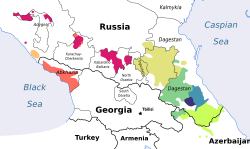Lezgic languages
Appearance
| Lezgic | |
|---|---|
| Geographic distribution | |
| Linguistic classification | Northeast Caucasian
|
| Proto-language | Proto-Lezghian language |
| Subdivisions | |
| Language codes | |
| Glottolog | lezg1248 |
 Lezgic | |
The Lezgic languages are one of seven branches of the Northeast Caucasian language family. Lezgin and Tabasaran are literary languages.
Classification
[edit]The voicing of ejective consonants
[edit]The Lezgic languages are relevant to the glottalic theory of Indo-European, because several have undergone the voicing of ejectives that have been postulated but widely derided as improbable in that family. The correspondences have not been well worked out (Rutul is inconsistent in the examples), but a few examples are:
- Non-Lezgic: Avar tstsʼar; Lezgic: Rutul dur, Tsakhur do 'name'
- Non-Lezgic: Archi motʃʼor, Lak tʃʼiri; Lezgic: Rutul mitʃʼri, Tabassaran midʒir, Aɡul mudʒur 'beard'
- Non-Lezgic: Avar motsʼ; Lezgic: Tabassaran vaz 'moon'
A similar change has taken place in non-initial position in the Nakh languages.[3]
See also
[edit]References
[edit]- ^ a b 7. НАСЕЛЕНИЕ НАИБОЛЕЕ МНОГОЧИСЛЕННЫХ НАЦИОНАЛЬНОСТЕЙ ПО РОДНОМУ ЯЗЫКУ
- ^ a b Languages in the Caucasus, by Wolfgang Schulze (2009) Archived 2011-06-10 at the Wayback Machine
- ^ Paul Fallon, 2002. The synchronic and diachronic phonology of ejectives, p 245.


